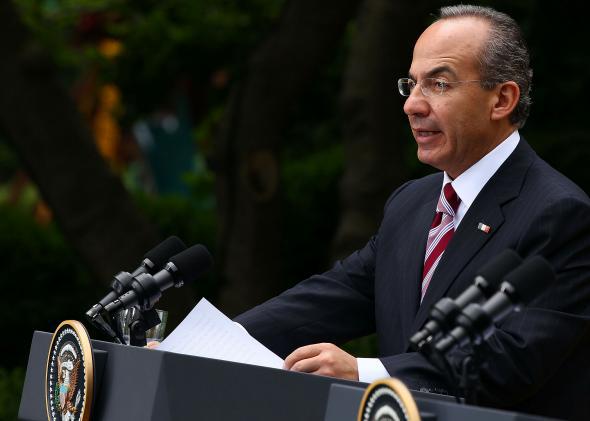A new report released Tuesday said an ambitious global plan to rid the world of fossil fuels—and generate half of the world’s new energy from renewable sources in just 15 years—could produce more economic benefits than costs, considering the anticipated boost to public health. The report is timed to coincide with next week’s United Nations climate summit in New York and defies conventional wisdom, arguing that the act of decoupling the global economy from carbon emissions is not only necessary for the health of the planet, it’s also one of the best ways to generate widespread economic growth.
The Guardian has a summary of the seven key takeaways from the new report, which was led by former Mexican president Felipe Calderón. The report was produced by a group called the Global Commission on the Economy and Climate, made up of CEOs and current and former political and economic leaders, appointed by countries as economically diverse as Ethiopia and the United Kingdom.
Essentially, the report takes a refreshingly short-term look at what many still assume to be a long-term problem. Here’s the basic calculation: Assume $90 trillion is likely to be spent on infrastructure anyway over the next 15 years, and it would take only an additional $4 trillion to rapidly scale up climate-friendly alternatives. The biggest issue is, at current rates, an additional $9 trillion would be spent in subsidies to the fossil fuel industry over the same time span—a gross misallocation of funds if we’re serious about tackling global warming.
Basically, if we just end government’s long-term relationship with the fossil fuel industry, we could fix climate change. For free.
The report is not without critics. Earlier this year, the Intergovernmental Panel on Climate Change refused to put a hard number on the economic benefits of improved public health resulting from less fossil fuel pollution due to the difficulties inherent in making such an estimate. The New York Times quotes an author of that report, Ottmar Edenhofer, a German economist and skeptic of the new report’s methodology, as saying “climate policy is not a free lunch, but it is a lunch worthwhile to buy.”
The plummeting cost of solar and other renewable energy sources has changed the economic calculus, the new report says, and it’s time to take advantage. The recommendations emphasize the need for immediate action: setting a price on carbon, ending fossil fuel subsidies, modernizing global agriculture, and banning new coal-fired power plants. The world’s poor would stand to benefit the most, as cheap renewable energy would help the more than a billion people who still don’t have access to electricity.
In an op-ed for USA Today, Calderón wrote:
For years we’ve heard that fighting climate change will hurt economic growth. But new analysis finds this is simply not true. In fact, reducing greenhouse gas emissions requires action in the very same areas that throughout history have driven economic growth: investment in efficiency, infrastructure and innovation. Well-managed policy and business investment in these fields can create growth and reduce the risks of dangerous climate change at the same time.
For world leaders, the report should be a wake up call. (This is especially true in the United States, which is smack in the middle of a fossil fuel renaissance.) There is no other reason remaining other than vested self-interest to continue to fund the fossil fuel industry with public money.
On Twitter, Barack Obama welcomed the new report:
Despite Obama’s rhetoric on climate, during Obama’s presidency, fossil fuel subsidies have grown by 45 percent, a result of his “all of the above” energy strategy. Mr. President, it’s time to put your money where your mouth is. America’s oil age is coming to an end. Prolonging it with our tax dollars isn’t just short-sighted—it’s irresponsible.
